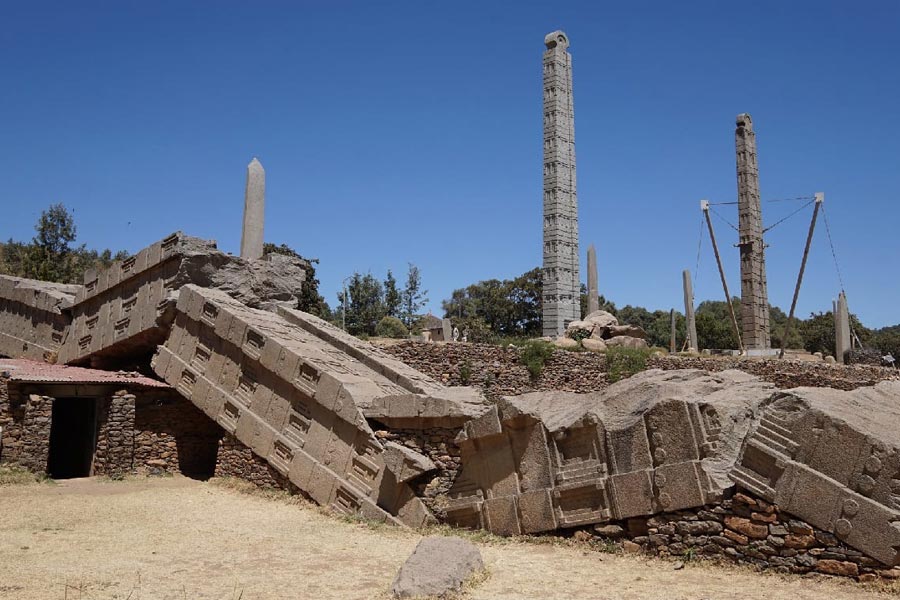
Sunday with Eden | Sep 10,2023
Jul 8 , 2023
By Asrat Begashaw
An eco-revolution is happening in the heart of Ethiopia, where the humble village of Choke Mountains is rewriting the rules of the tourism playbook. Home to the Mulu Eco Lodge, it has just been crowned the Best Tourism Village by the UN World Tourism Organisation, a well-deserved recognition for this champion of sustainable tourism.
The lush terrains, rich historical legacy, and unique wildlife of Ethiopia offer an intriguing lens through which to examine sustainable tourism, a concept rapidly gaining currency in today's global travel industry. At the epicentre of this discussion, nestled amidst the spectacular mountains in the Amhara Regional State, is a paragon of sustainable tourism, uniting the trifecta of environmental stewardship, socio-economic growth, and community empowerment.
Mulu Eco Lodge, held to the microscope of strict evaluative criteria, exhibited exemplary dedication to sustainable practices in numerous spheres.
Ethiopia's vista of sustainable tourism paints a vivid portrait of ecological responsibility. An abundant plethora of natural resources, including the awe-inspiring Choke Mountain and the serene Kajam River, beckon travellers from all corners of the globe. Yet, the Mulu Eco Lodge understands that it is entrusted with a mission of showcasing these wonders and safeguarding them through meticulous waste management, biodiversity protection, and energy conservation.
This harmonious symphony of human habitation and nature preservation is echoed in the lodge's approach to conservation. A staunch commitment to protecting the area's lush rainforests and diverse wildlife species finds the eco-lodge playing an active role in numerous local conservation efforts.
The lodge's operational ethos embraces environmentally sound practices, from utilising renewable energy sources and waste reduction strategies to implementing sustainable farming techniques.
Accommodation options at the lodge are a testament to its devotion to environmental sustainability. Rustic rooms constructed from eco-friendly materials offer guests a comfortable stay that, rather than imposing on the natural surroundings, assimilates seamlessly into them.
A peek into the lodge's itinerary of eco-tours and guided activities offers a tantalising taste of immersive, conscientious travel. Guests are invited to lose themselves in nature's marvels, from thrilling canopy walks to intriguing cave explorations, all while gaining valuable insights into the importance of ecosystem conservation.
A stay at the lodge is not simply a vacation—it is an investment in the local community's sustainability and development. It is a moving testament to the positive impacts that responsible tourism can engender for the environment and the communities that call it home.
Yet, the blueprint of sustainable tourism in Ethiopia goes beyond the protection of its natural assets. It involves the painstaking preservation of the country's innumerable cultural treasures, such as the rock-hewn churches of Lalibela, the iconic obelisks of Axum, and the majestic castles of Gondar.
Sustainable tourism initiatives are centred on fostering cultural awareness, promoting traditional crafts, and engendering respectful tourist behaviour.
At the core of Ethiopia's sustainable tourism vision is empowering its communities. As custodians of the country's vast natural and cultural wealth, local communities have a crucial role in tourism. By engaging them in decision-making and ensuring they partake in the benefits of tourism, sustainable livelihoods can be fostered, and poverty can be reduced.
Education forms a central pillar of sustainable tourism. Awareness programs informing visitors about their host country's customs, traditions, and etiquette are crucial for fostering cultural exchange and promoting responsible behaviour. By cultivating an understanding and respect for local cultures and supporting local economies, sustainable tourism sets the stage for mutually beneficial interactions between visitors and communities.
In essence, the ethos of sustainable tourism forms a cornerstone of Ethiopia's tourism strategy.
By weaving together environmental, socio-economic, and cultural considerations, Ethiopia can cultivate a thriving tourism industry that does not detract from but rather enriches its remarkable natural and cultural heritage. Through the judicious stewardship of resources, the empowerment of communities, and the education of visitors, Ethiopia is paving the way for a tourism model that benefits current and future generations.
It is a beacon illuminating the path towards a future where travel no longer needs to be at odds with sustainability.
PUBLISHED ON
Jul 08,2023 [ VOL
24 , NO
1210]


Sunday with Eden | Sep 10,2023

Fortune News | Apr 03,2021

Fortune News | Aug 29,2025

Featured | Sep 04,2021

View From Arada | Dec 16,2023

Fortune News | Feb 22,2020

Radar | Oct 11,2020

Money Market Watch | Dec 01,2024

Fortune News | Nov 25,2023

Viewpoints | Jul 02,2022

Photo Gallery | 171693 Views | May 06,2019

Photo Gallery | 161932 Views | Apr 26,2019

Photo Gallery | 151676 Views | Oct 06,2021

My Opinion | 136317 Views | Aug 14,2021





Dec 22 , 2024 . By TIZITA SHEWAFERAW
Charged with transforming colossal state-owned enterprises into modern and competitiv...

Aug 18 , 2024 . By AKSAH ITALO
Although predictable Yonas Zerihun's job in the ride-hailing service is not immune to...

Jul 28 , 2024 . By TIZITA SHEWAFERAW
Unhabitual, perhaps too many, Samuel Gebreyohannes, 38, used to occasionally enjoy a couple of beers at breakfast. However, he recently swit...

Jul 13 , 2024 . By AKSAH ITALO
Investors who rely on tractors, trucks, and field vehicles for commuting, transporting commodities, and f...

Oct 4 , 2025
Eyob Tekalegn (PhD) had been in the Governor's chair for only weeks when, on Septembe...

Sep 27 , 2025
Four years into an experiment with “shock therapy” in education, the national moo...

Sep 20 , 2025
Getachew Reda's return to the national stage was always going to stir attention. Once...

Sep 13 , 2025
At its launch in Nairobi two years ago, the Africa Climate Summit was billed as the f...

Oct 5 , 2025 . By NAHOM AYELE
In Meqelle, a name long associated with industrial grit and regional pride is undergo...

Oct 5 , 2025 . By BEZAWIT HULUAGER
The federal government is set to roll out a new "motor vehicle circulation tax" in th...

Oct 5 , 2025 . By NAHOM AYELE
The Bank of Abyssinia is wrestling with the loss of a prime plot of land once leased...

Oct 5 , 2025 . By BEZAWIT HULUAGER
The Customs Commission has introduced new tariffs on a wide range of imported goods i...